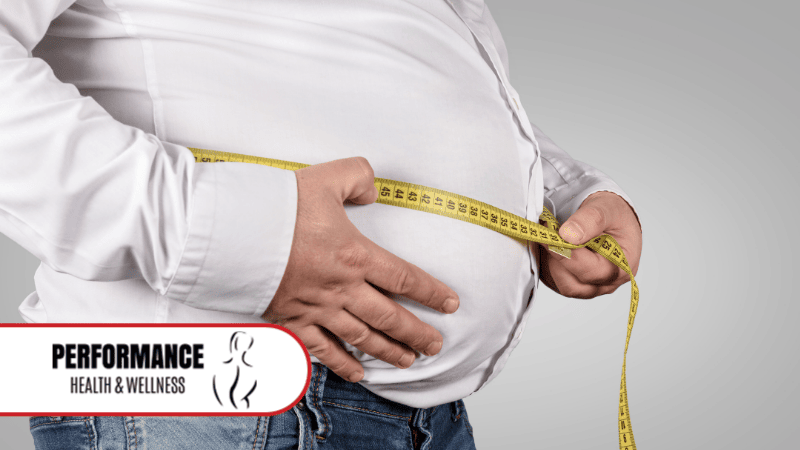Did you know there is more than one type of fat in the body? While about 90% of fat is typically under the skin (subcutaneous fat), the other 10% is fat that resides deeper in the body (visceral fat). A certain level of subcutaneous fat is good for the body, as it is used as fuel and creates padding for the muscles and bones to protect from impact. This type of fat also helps to insulate the body. While some subcutaneous fat is good for you, too much increases your risk of developing health complications. Visceral fat, on the other hand, increases health risks without offering any of the benefits of subcutaneous fat. Taking steps to lose weight can help you fight the health risks associated with both types of fat and understanding the risks of visceral fat can help you take control of your health.
Visceral Fat: The Dangerous Belly Fat
What Is Visceral Fat?
This type of fat is stored deep within the belly underneath the skin and it wraps around the organs. The amount of visceral fat a person has is not always apparent, as it resides deep enough in the body that it doesn’t necessarily make a person look large.
Why Is Visceral Fat Dangerous?
While too much body fat, in general, can raise your risk of developing health conditions, large amounts of visceral fat tends to raise your risks more than subcutaneous fat. Since visceral fat sits closer to the organs, the hormones released by these fat cells can cause inflammation of the organs which leads to narrowed blood vessels and subsequent increased blood pressure. For similar reasons, a large amount of visceral fat has been linked to heart disease including stroke, heart attack, and angina. Visceral fat can make your body less sensitive to insulin and can increase your risk of developing type 2 diabetes. There is also an association between high levels of visceral fat and the development of Alzheimer’s disease.
How To Identify Visceral Fat
Because this is a deep-lying fat that doesn’t present itself, there is no real way to know what your visceral fat levels are just by looking. Some indicators that you may be at risk of having high visceral fat deposits include your family health history; if there is a history of insulin resistance, heart disease, or non-alcoholic fatty liver, you may be at a greater risk for storing visceral fat. Visceral fat also tends to be around the stomach and is associated with belly fat. Another key sign is that subcutaneous fat tends to be squishy and pinchable, whereas visceral fat tends to be firm when you press it. CT scans and MRI scans are the only truly accurate way of identifying visceral fat, but these options tend to be very expensive and inaccessible for most people.
How To Reduce Visceral Fat
In general, the best thing you can do to reduce and prevent the development of visceral fat is to commit to healthy living, including a clean diet and regular exercise. Taking steps to lose weight in general will help to reduce visceral fat
Combat Visceral Fat With A Weight Loss Program
A weight loss exercise program can help reduce visceral fat and the health risks associated with it. By keeping active and eating right, you can help to minimize your stores of visceral fat and lower your risk of developing health issues such as heart disease and diabetes. At Performance Health And Wellness in Irvine, we offer individualized weight loss programs through a personalized eating plan and weight loss exercise routine. At Performance Health and Wellness, our weight loss clinic focuses on the health benefits of clean and healthy living and we tailor your weight loss program around your personal needs, including lifestyle and any preexisting health conditions. To start your weight loss journey and begin living healthier, contact Performance Health and Wellness at 1-949-476-1250 or fill out the online contact form.
FAQ
Does a weight loss program mean I have to give up eating foods I enjoy?
No, although the fatty and sugary foods you consume may be limited. While your diet will be altered, the key to healthy eating is to make it sustainable. Your professionally trained weight loss instructor will help you find healthy foods you enjoy and balance that with your current diet so that you can eat well and still enjoy meals. Performance Health and Wellness also offers nutrition counselling to help with your weight loss journey.
I find working out difficult because I don’t know the proper form for lifting weights or what exercises help what muscles. Can Performance Health and Wellness teach me?
Yes, Performance Health and Wellness offers personal professionally trained exercise specialists who can help you learn how to exercise safely and effectively.
How does weight loss benefit health?
Weight loss has been linked to lowered rates of blood pressure, cholesterol, blood sugar, and chronic diseases related to obesity. Weight loss also typically involves increased exercise, which strengthens the heart, lungs, and joints. Weight loss and exercise can also help to facilitate sleep and improve mental health and self-esteem.

